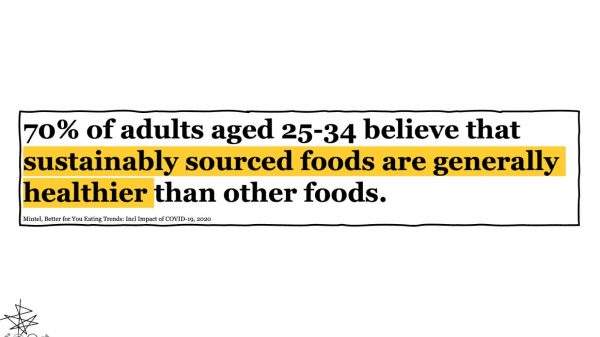
Consumers increasingly associate sustainable practices from food companies with good health.
Allison Beadle, CEO of Wild Hive, says consumers interest in sustainability is rising quickly, and produce companies need to present a holistic marketing message.
“We’ve talked about health for years, but we need to pay better attention to where consumers are,” she said on a March 10 United Fresh BB #:145458 Brandstorm education session webinar.
Thankfully for fresh produce companies, consumers connect sustainability with healthy food, even though there’s no data that shows that.
Does that mean marketers should feed this misperception?

Beadle won’t outright say yes, but she says marketers can address both consumer interests in sustainability and health, by using science, data and emotion to connect with them.
She calls it the Well-Aware Mindset, which markets to consumers’ converging interests.

“Consumers are holding brands to an unprecedentedly high level now,” Beadle said.
“From a communications standpoint, it’s important that brands address both interests—sustainability and health—while staying true to the science, which is critical for trust.”
Beadle presented data from an FMI study that showed 81 percent of consumers say transparency is important, with it being defined as telling consumers both what’s in their food and how it’s made.
As for who consumers will trust giving them that message, the study showed 95 percent of consumers say they trust farmers on some level.
“Consumers are more educated and critical than they’ve ever been, so we have to take ownership of messaging and building trust,” she said. “They expect holistic messaging from us.”
Consumers increasingly associate sustainable practices from food companies with good health.
Allison Beadle, CEO of Wild Hive, says consumers interest in sustainability is rising quickly, and produce companies need to present a holistic marketing message.
“We’ve talked about health for years, but we need to pay better attention to where consumers are,” she said on a March 10 United Fresh BB #:145458 Brandstorm education session webinar.
Thankfully for fresh produce companies, consumers connect sustainability with healthy food, even though there’s no data that shows that.
Does that mean marketers should feed this misperception?

Beadle won’t outright say yes, but she says marketers can address both consumer interests in sustainability and health, by using science, data and emotion to connect with them.
She calls it the Well-Aware Mindset, which markets to consumers’ converging interests.

“Consumers are holding brands to an unprecedentedly high level now,” Beadle said.
“From a communications standpoint, it’s important that brands address both interests—sustainability and health—while staying true to the science, which is critical for trust.”
Beadle presented data from an FMI study that showed 81 percent of consumers say transparency is important, with it being defined as telling consumers both what’s in their food and how it’s made.
As for who consumers will trust giving them that message, the study showed 95 percent of consumers say they trust farmers on some level.
“Consumers are more educated and critical than they’ve ever been, so we have to take ownership of messaging and building trust,” she said. “They expect holistic messaging from us.”
Greg Johnson is Director of Media Development for Blue Book Services





